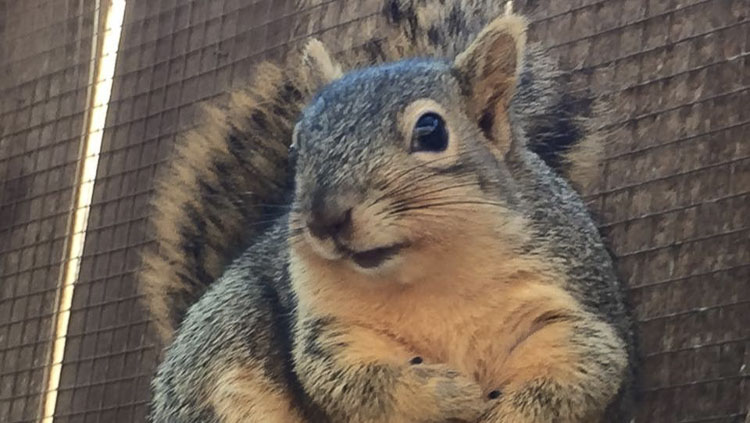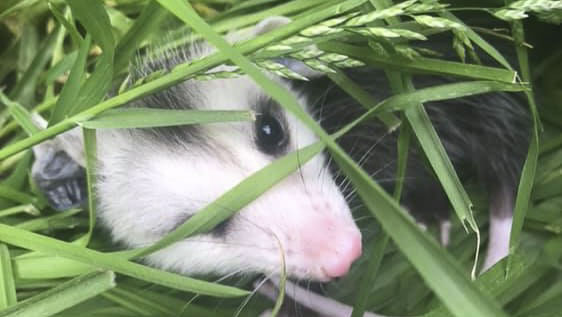
Licensed animal rehabilitation facility in Clark County cares for injured or orphaned small mammals
For the most part, the animals that arrive at Squirrel Refuge have no future.
Until, that is, they are saved.
“When I see a baby being released out into the wild that technically had already died once, there is no amount of money that could make up for that,” Michael Bacon said, his voice cracking. “That’s why we do it.”
Michael and Sharon Bacon run the Squirrel Refuge, a place where injured, abandoned, or orphaned small mammals are brought in to recover and be rehabilitated. The refuge is headquartered in Vancouver but has a facility in Camas where many animals are cared for prior to their return to the wild..
“It’s doing something for someone who doesn’t have a voice,” Michael said. “That, in itself, is its own reward.”
“We love the animals,” Sharon Bacon added. “We love working with the animals.”

Squirrel Refuge, as its name suggests, focuses mostly on squirrels. But the facility is licensed for small mammals such as opossums, rabbits, and chipmunks. Plus, other animals, with the exception of deer and birds, can be brought in, stabilized, then transferred to facilities in the region to be cared for by professionals.
The refuge was founded by Jackie Marsden in 2010.
It was about that time when Michael and Sharon found their first injured, battered squirrel near their door. They did not know much, but they wanted to help.
“We did everything wrong,” Michael acknowledged. “Somehow, he survived.”
The Bacons, though, wanted to learn more, to be better prepared if it happened again. They reached out to the refuge. Soon enough, they became volunteers, helping Marsden.
In 2016, Marsden stepped away from operating the refuge. The Bacons have been running it since.
“We couldn’t let the dream go,” Michael said.
Sharon added that they could not do it without the help of about 20 volunteers. They show up to feed the animals and clean the cages and holding areas.
In fact, the refuge is made up of all volunteers. Michael and Sharon do not take a salary. It is a labor of love.
“There isn’t a paid position at the refuge,” Michael Bacon said.
But it does have plenty of expenses.

The refuge has annual fundraising operations that typically raise enough for food and care. But now the refuge has set up a GoFundMe account, asking for donations that will go toward a new roof and construction of a bigger facility.
Earlier this week, the refuge was caring for close to 50 squirrels. That includes eastern grays, fox Squirrels, Douglas squirrels, and a California ground squirrel. The California ground squirrel, by the way, looks like a squirrel that has been bodybuilding — huge compared to the typical squirrel one would find in a backyard in Vancouver.
That number would have been higher, Michael Bacon said, if not for the Nakia Creek Fire earlier this year, which came within a mile-and-a-half of the facility in Camas.
In the 11 years that the Bacons have been working at the refuge, they said they have helped rehabilitate thousands of squirrels and other small mammals. Sharon said more than 90 percent of injured or orphaned squirrels are returned to the wild.
One of their favorite rescue stories was that of a river otter that was hit by a car. The otter was taken to the refuge for immediate care, then transported to PAWS — Progressive Animal Welfare Society — in Seattle. A month later, the otter was deemed ready to return. It was released back into Salmon Creek.
“As soon as he went into the water, we heard this slap. It was his mate, letting him know that she was there,” Michael said. “They swam out to the middle of Salmon Creek and started doing a happy dance.”
The Bacons are encouraged that there are so many folks out there willing to help when they see an injured animal. They stress, however, not to try to do too much. Again, they said that they got the wrong information when they tried to help their first squirrel and almost did more harm. They later learned the proper protocols.
Giving the wrong food to an injured baby squirrel, for example, can be deadly.
“Do not feed them,” Sharon said. “You do not have the right formulas.”
Their advice: Call the refuge.
It is also important to realize that the squirrels and any other mammals brought to the refuge are not to be considered pets. Squirrels can and do injure humans.
“These are wild animals,” Michael Bacon said. “As a result, they have all the natural instincts of a wild animal. When they get upset or mad, they are going to come out with teeth and claws.”
Squirrels do not make good pets, Michael added.
But they are important to an ecosystem, and they are living creatures.
With the help of Michael and Sharon Bacon, and the other volunteers at Squirrel Refuge, more squirrels in danger are getting a second chance at life.
To donate to Squirrel Refuge, go to its GoFundMe page at: https://gf.me/v/c/wxj6/help-clark-counties-wildlife
According to the page, Squirrel Refuge is an IRS recognized 501(c)(3) nonprofit. “Our goal is to further the well being of these amazing creatures; as well as provide a source of accurate information through public education to further care and concern for all wildlife.”
Squirrel Refuge is the only licensed wildlife rehabilitator in Clark County. The refuge works with local veterinarians, the Washington Department of Fish & Wildlife (WDFW), wildlife experts across the nation, and a network of volunteers to facilitate professional and humane care in all phases of rehabilitation for orphaned, sick, and injured wildlife.
While the refuge is licensed to conduct legal wildlife rehabilitation activities through the WDFW, it is not part of the WDFW. The refuge is privately run by non-paid volunteers.
Also read:
- Opinion: OIC tells consumers not to pay for ‘insurance’ you won’t likely benefit from: Does that include WA Cares?Elizabeth New (Hovde) of the Washington Policy Center believes you should consider yourself warned by the Office of the Insurance Commissioner about WA Cares and its maybe-only benefit.
- Opinion: Same road, different speed limit?Target Zero Manager Doug Dahl addresses a question about speed limit signs going into and leaving town.
- Progress being made at GRO Parade of Homes siteThe 2024 GRO Parade of Homes, presented by the Building Industry Association of Clark County, is a little more than a month away, and builders are busy completing the luxury homes before the big event, scheduled for Sept. 6 through 22 in Felida.
- Has trust in the media tanked over coverage of President Biden’s decline?After President Joe Biden’s calamitous debate performance against former President Donald Trump, and days after Biden’s decision Sunday not to seek reelection, there are still many questions about how the news media covered Biden’s mental and physical decline.
- Opinion: Hiding the growing cost of the Interstate Bridge replacementJoe Cortright of the City Observatory addresses the rising cost of the Interstate 5 Bridge replacement project.
- Letter: ‘This election I am NOT voting for Greg Cheney’Clark County resident Wynn Grcich shares her thoughts on Rep. Greg Cheney and the issue of fluoridation in area drinking water.
- Major gas line leak closes major arterial in Clark CountyFirefighters from Clark County Fire District 6 responded Thursday (July 25) afternoon to the scene of a major natural gas leak on NE 99th Street, directly in front of Columbia River High School.











